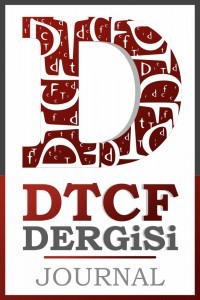BATIYA ÖZGÜ TRAVMA YAZINBİLİMİ VE SIERRA LEONE'A ÖZGÜ İYİLEŞME YOLLARI ARASINDAKİ KORELASYONLAR: AMINATTA FORNA'NIN “THE MEMORY OF LOVE” İSİMLİ ROMANI
Aminatta Forna eserlerinde travma ve travmayı iyileştirme yollarıyla ilgilenmektedir. Bu doğrultuda, The Memory of Love 2010 isimli eseri, Sierra Leoneluların 1980lerde yaşadığı sosyal ve politik ayaklanmaları ve akabinde 1991’den 2002’ye kadar devam eden iç savaşın korkunç gerçekliğini yansıtarak travma ve travmayla baş etme yollarına odaklanır. Geçmiş zamanda yazılan anlatıların tersine, romanın çoğunluğu geniş zamanla yazılmıştır. Bu sayede, roman zamanı deneye tabi tutar ve okuyucuların Sierra Leone’un kaotik atmosferine tanıklık etmesini sağlar. Ayrıca, roman Sierra Leoneluların belirli bir amaç edinme ve çevreyle yakın iletişim kurma gibi travmayla baş etme stratejilerini konu edinir. Bu temellere dayanarak, bu çalışmanın amacı, romanın Sierra Leoneluların travmasını travmatik zamanın sınırları belirli olmayan özelliğini ve Sierra Leoneluların travmayla baş etme yollarını kullanarak nasıl ele aldığını incelemektir.
Anahtar Kelimeler:
Aminatta Forna, The Memory of Love, Sierra Leone, Travma, İyileşme
CORRELATIONS BETWEEN WESTERN TRAUMA POETICS AND SIERRA LEONEAN WAYS OF HEALING: AMINATTA FORNA'S THE MEMORY OF LOVE
Aminatta Forna has been interested in the representation of trauma and ways of healing trauma in her works. Accordingly, Forna’s The Memory of Love 2010 centralises trauma and healing by reflecting on dreadful historical facts of Sierra Leoneans suffering from social and political uprisings in the 1980s and the following civil war which lasted from 1991 to 2002. The novel is written in the present tense for the greater part unlike the conventions of a narrative written in the past. In doing so, the novel experiments with time and makes readers witness the chaotic atmosphere of Sierra Leone. Besides, the novel presents non-western trauma coping strategies adopted by Sierra Leoneans such as maintaining an intact sense of purpose and establishing close contact with one’s environment. Based on these premises, the aim of this paper is to examine how the novel recounts the trauma of Sierra Leoneans through the employment of the amorphous quality of traumatic time and trauma coping strategies adopted by Sierra Leoneans.
Keywords:
Aminatta Forna, The Memory of Love, Sierra Leone, Trauma, Healing,
___
- American Psychiatric Association. Diagnostic and Statistical Manual of Mental Disorders. DSM-III. 3rd Ed. Washington: American Psychiatric Association, 1980.
- Appiah, Anthony, and Henry Louis Gates. Africana: The Encyclopaedia of the African and African American Experience. Oxford: Oxford UP, 2005.
- Beah, Ishmael. A Long Way Gone: Memoirs of a Boy Soldier. New York: Farrar, Straus and Giroux, 2007.
- ---. Radiance of Tomorrow. New York: Farrar, Straus and Giroux, 2014.
- Barker, Pat. Another World. New York: Farrar, Straus and Giroux, 1998.
- Craps, Stef. “Beyond Eurocentrism: Trauma Theory in the Global Age.” The Future of Trauma Theory: Contemporary Literary and Cultural Criticism. Ed. Gert Buelens, Sam Durrant, and Robert Eaglestone. Abingdon: Routledge, 2014. 45-61.
- Doran, Jennifer M. et al. “The Relationship between Trauma and Forgiveness in Post-Conflict Sierra Leone.” Psychological Trauma: Theory, Research, Practice, and Policy. 2012. 4.6 (2012): 614-623.
- Dori Laub. “Bearing Witness, or the Vicissitudes of Listening.” Testimony: Crises of Witnessing in Literature, Psychoanalysis and History. Ed. Shoshana Felman and Dori Laub. London and New York: Routledge, 1992. 57-74.
- Forna, Aminatta. The Devil that Danced on the Water: A Daughter’s Memoir. London: HarperCollins, 2002.
- ---. Ancestor Stones. London: Bloomsbury, 2006.
- ---. The Memory of Love. London: Bloomsbury, 2010.
- ---. The Hired Man. London: Bloomsbury, 2013.
- ---. The Angel of Mexico City. Worldreader, 2014.
- ---. Happiness. London: Bloomsbury, 2018.
- Forna, Aminatta and Valeriu Nicolae. “Memory and Forgetting: Aminatta Forna and Valeriu Nicolae in Conversation.” Index on Censorship 35.2 (2006): 74-81.
- Freud, Sigmund. “Project for a Scientific Psychology.” The Standard Edition of the Complete Psychological Works of Sigmund Freud. Vol. I. Ed. and Trans. James Strachey. London: Hogarth Press, 1950. 281-391.
- Ganteau, Jean-Michel. “Vulnerable Form and Traumatic Vulnerability: John McGregor’s Even the Dogs.” Contemporary Trauma Narratives: Liminality and the Ethics of Form. Ed. Jean Michel Ganteau and Susana Onega. New York and London: Routledge, 2014. 89–103.
- ---. “‘The Past Won’ Fit into Memory Without Something Left over’: Pat Barker’s Another World, in between Narrative Entropy and Vulnerability.” Trauma and Romance. Ed. Susana Onega and Jean-Michel Ganteau. New York and London: Routledge, 2013. 17-33.
- Human Rights Abuses Committed by Ruf Rebels. Web. 15 February 2018.
- Jarret-Macauley, Delia. Moses, Citizen, and Me. London: Granta, 2005.
- Kline, Paul M., and Erin Mone. “Coping with War: Three Strategies Employed by Adolescent Citizens of Sierra Leone.” Child and Adolescent Social Work Journal 20.5 (2003): 321-333.
- Krishnan, Madhu. “Affect, Empathy, and Engagement: Reading African Conflict in the Global Literary Marketplace.” The Journal of Commonwealth Literature 52.2 (2015): 212-230.
- McGregor, John. Even the Dogs. London: Bloomsbury, 2010.
- Norridge, Zoe. “Sex as Synecdoche: Intimate Languages of Violence in Chimamanda Ngozi Adichie’s Half of a Yellow Sun and Aminatta Forna’s The Memory of Love.” Research in African Literatures 43.2 (2012):18-39.
- Rothberg, Michael. Traumatic Realism: The Demands of Holocaust Representation. Minneapolis: Minnesota UP, 2000.
- Visser, Irene. “Trauma Theory and Postcolonial Literary Studies.” Journal of Postcolonial Writing 47.3 (2011): 270-282.
- Yayın Aralığı: Yılda 2 Sayı
- Başlangıç: 1942
- Yayıncı: Ankara Üniversitesi
Sayıdaki Diğer Makaleler
İNSAN-MERKEZCİLİĞE MEYDAN OKUMA: SAKI'NİN “SREDNI VASHTAR” ADLI ÖYKÜSÜNDE ANİMİZM KULLANIMI
TARİH'TE HORASAN'IN YERİ İSL MİYET DÖNEMİ
ANADOLU'DA ÖZGÜN BİR EKONOMİK AKTÖR TİPİ: HOMO KAYSERİCUS
YAKACIK ÇAYI HAVZASININ HATAY MORFOMETRİK ANALİZİ
Suzan ALTIPARMAK, Necla TÜRKOĞLU
'BİZ DE, KENDİ ÇAPIMIZDA AVRUPAYIZ': KÜRESELLEŞME IŞIĞINDA DAVID GREIG'İN AVRUPA ADLI OYUNU
FRANSIZ MATBUATINA GÖRE I. DÜNYA SAVAŞI'NDA IRAK CEPHESİNDE MEDÂYİN MUHAREBELERİ KÛTÜ'L-AMÂRE
